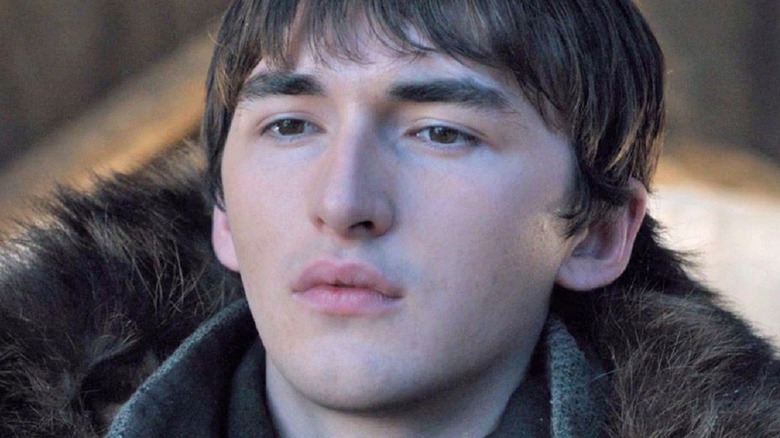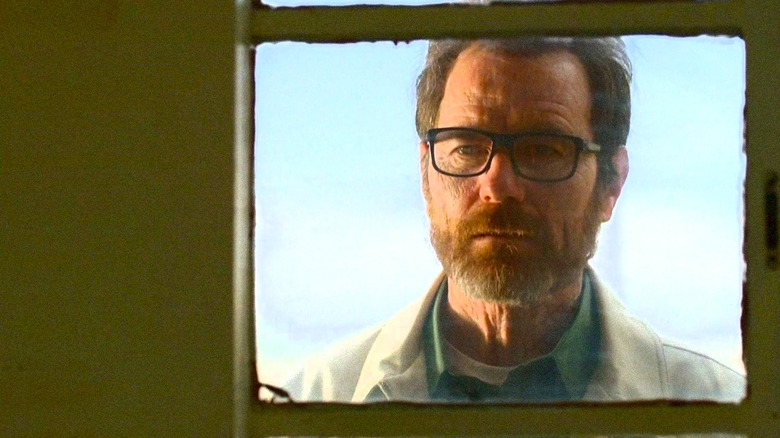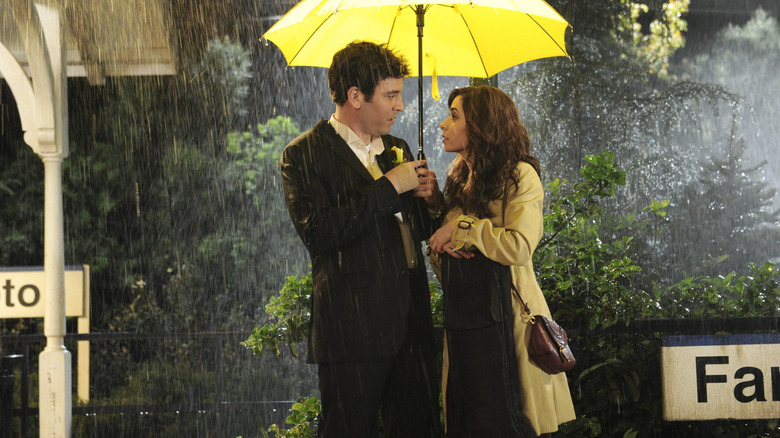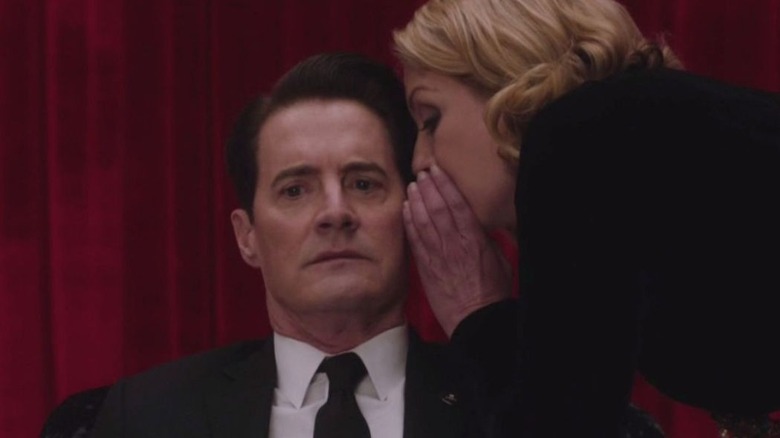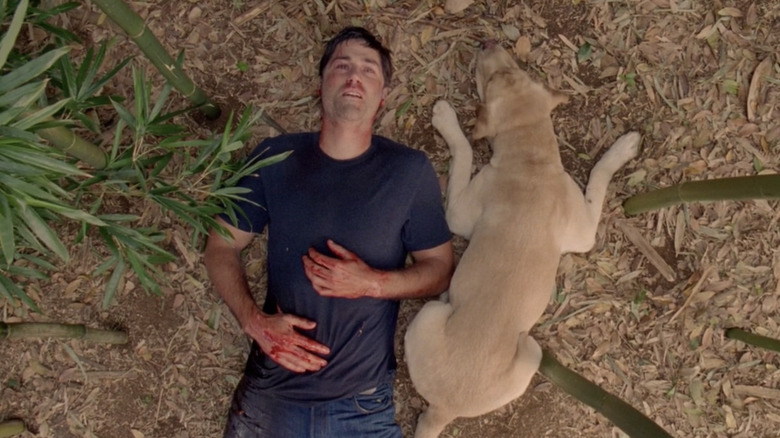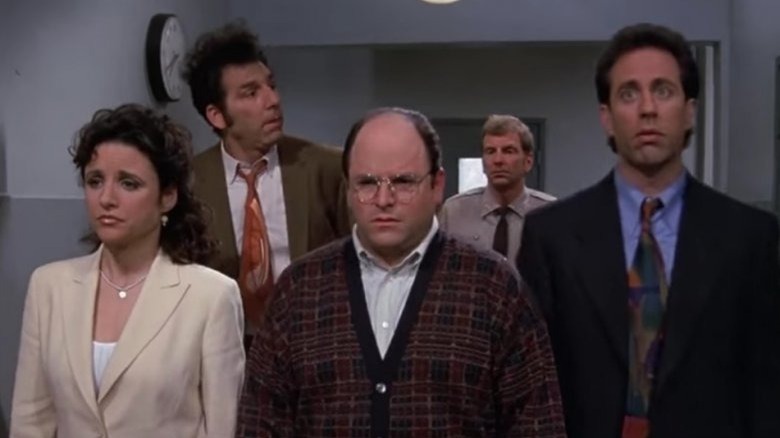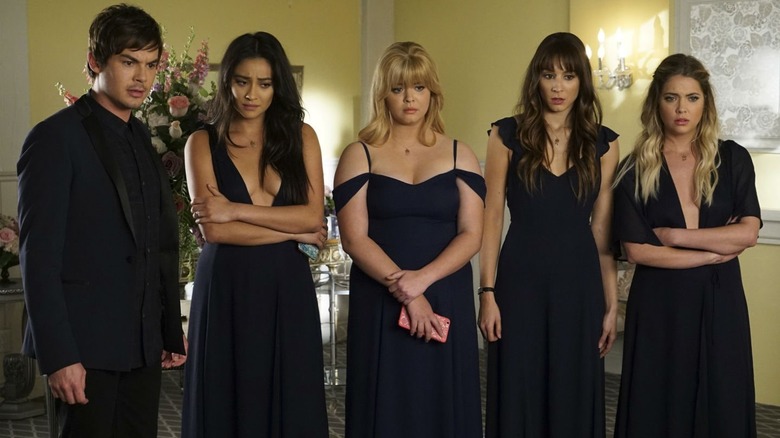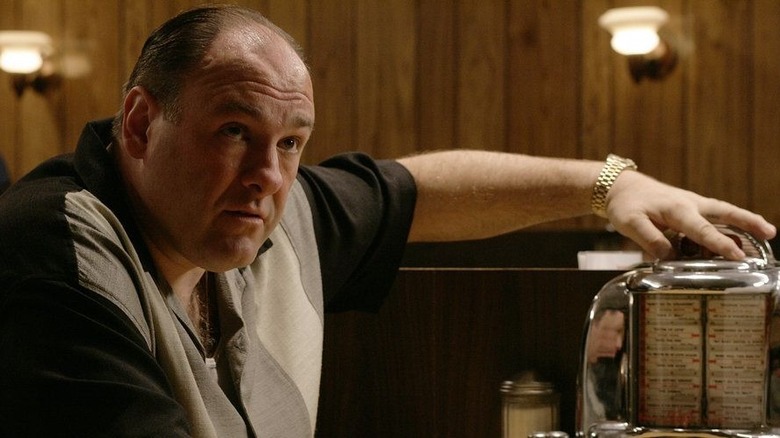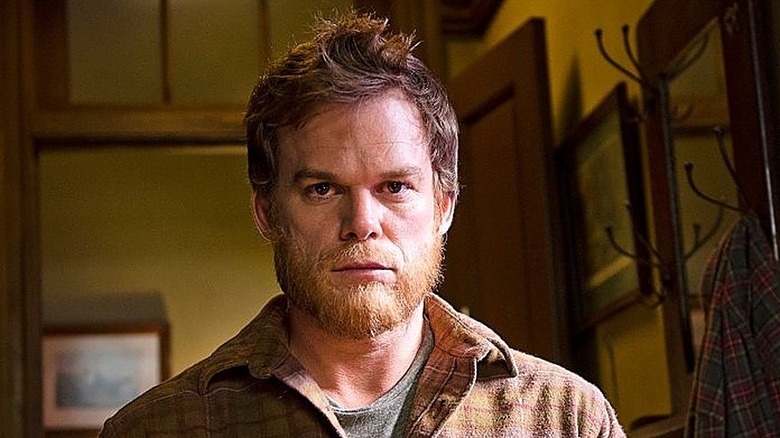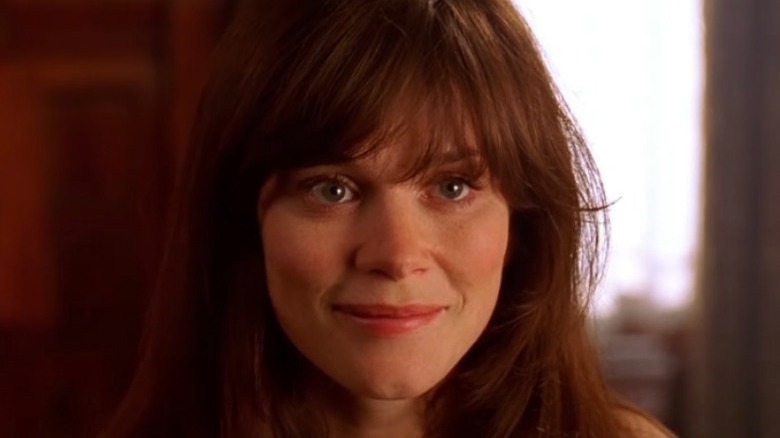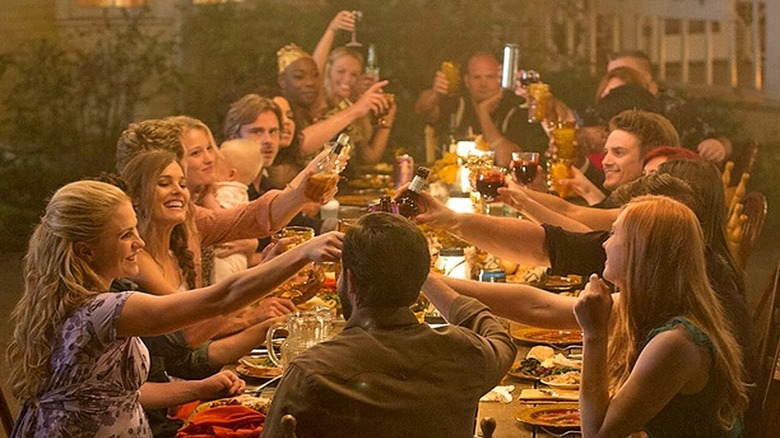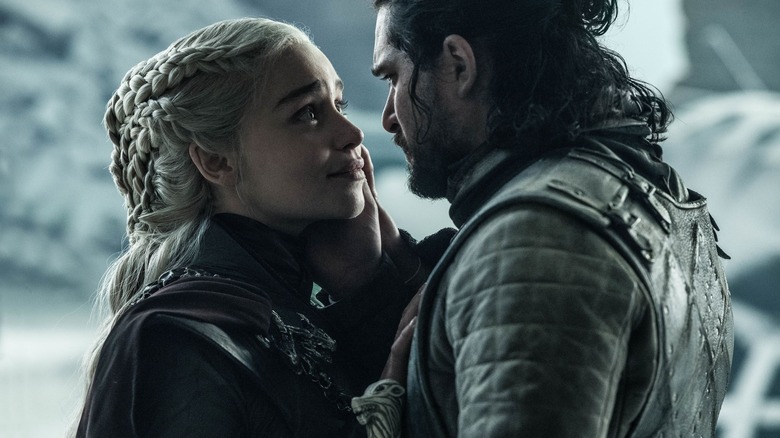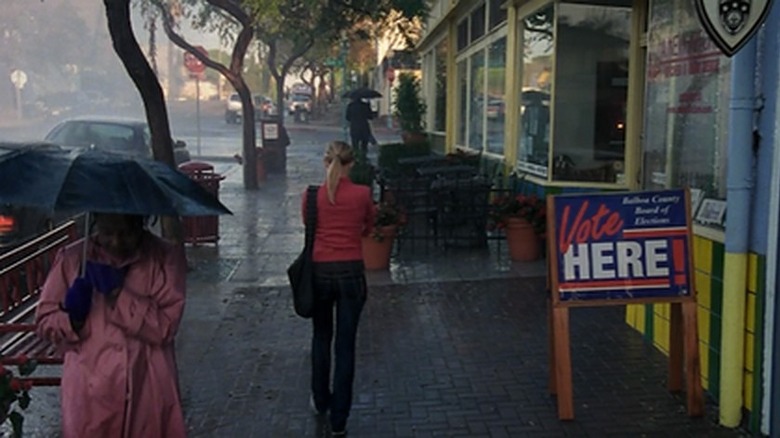Series Finales That Left Us With More Questions Than Answers
While no one wants their favorite show to end, if it has to happen, we all hope the conclusion feels satisfying (or unsatisfying in a gut-wrenching fashion that's fulfilling in its own way). But nobody wants a series to leave them hanging, shouting at the TV and asking questions that will never be resolved. Unfortunately, some of the greatest TV shows of all time have left us wondering what the heck just happened.
Sometimes, those unresolved questions are all part of the plan, with a show choosing to go out on an ambiguous note. Other times, those questions are thanks to a show being canceled before its time. And occasionally, it's because the showrunners were making things up as they went and didn't have a clear ending in sight. Regardless of why, these finales left fans heartbroken, disappointed, confused, angry, and asking questions — and this spoiler-filled list will show you why.
Breaking Bad
Creator Vince Gilligan admitted that the critically acclaimed "Felina" would probably be different from what many "Breaking Bad" fans imagined and, therefore, disappoint a fair number of people. But it did give most of its characters satisfying endings. The biggest lingering question wasn't really about the end itself but about how it all began. The show traces every inch of Walter White's transformation with brutal precision. What's missing is its true beginning, which is indirectly what made the ending so meaningful.
By blackmailing his old partners at Gray Matter, Walt achieves what he set out to do in the very first episode — provide for his family in the event of his demise. But we never really find out why he separated from them in the first place, choosing a life as a science teacher over a lucrative career as a chemist. Instead, we get multiple versions of the story. Walt's account suggests an origin for the bitterness that eventually led him to become a criminal mastermind. Gretchen insists he left without an explanation.
Walt's journey from schoolteacher to drug lord gets a lot of emphasis and rightly so. But given that it's potentially the impetus for his eventual life of crime, the transformation from all-star chemist to schoolteacher is the one we're really left wondering about.
How I Met Your Mother
You knew this one was going to be on the list. In addition to devastating fans, the finale of "How I Met Your Mother" left a lot of things uncertain. First of all, what kind of terminal illness did the mother have that could've come on so suddenly with such a poor prognosis but not seem to affect her youth and radiance in any way?
And as if the mother's cruel demise wasn't bad enough, what happened to her band? A pretty significant plot point that introduced Tracy's character — as well as being her first indirect first interaction with Ted — was the fact that Ted inadvertently helped her get her band back from a usurper. It was a big moment for both Tracy and them as a couple. Did they ever make it? ("They" meaning the band, since we know Ted and Tracy didn't.)
And, speaking of character and relationship development, we know Ted left the wedding mid-reception. But he met Tracy, the bassist for the wedding band, at the platform. Did she, a paid performer for the whole evening, suddenly dip out too? And speaking of dipping out, Ted would've been unemployed when he started dating Tracy because he quit his new position in Chicago to stay in New York with her. But even hopeless romantics have to pay their bills, so what's up with that?
Perhaps the greatest injustice of the series, however, was the fact that we never did find out where Ted got that pineapple.
Twin Peaks
While confusion is a David Lynch staple, the finale of the Showtime "Twin Peaks" revival left fans bewildered in an altogether different sense, even if it did in many ways make up for the notoriously erratic Season 2.
One of the most disorienting parts of the "Twin Peaks" universe (or perhaps the more accurate term is "universes?") is its relationship to time and truth. In the Season 3 finale, when Cooper asks, "What year is this?" not only does no one in the show have an answer, but no one behind the scenes or watching at home does either. Cooper may have moved forward or backward in time, may have entered an alternate timeline altogether, or maybe he's assumed an entirely new identity.
And on the note of new identities, the fundamental question of the first run of the series — who killed Laura Palmer? — evolved in the Showtime season into a question of who she was, period ... if she even still existed! In the twisted alternate timeline in which Cooper "saves" Laura, she becomes Carrie, someone else entirely. Does Laura technically exist anymore? Did she ever? Was she never able to be saved, or is she never truly able to be killed? And what did she whisper to Cooper in the final scene in the Red Room?
These are just a few of the questions it would probably take multiple years and even more realities to answer, if at all.
Lost
Ironically, the title of "Lost" aptly describes what happened to the thread of the series — which was complexly woven to begin with. The "Lost" timeline was often hard to follow, even before the finale, but fans by and large had fun with the twists and turns, and they trusted that the writers would tie it all up in the end. This happened for some loose ends, but many seemed to be forgotten or suddenly changed.
For example, plot devices like the "rules" of the island seemed to be inconsistently used, like when Charles Widmore sent operatives to the island to get revenge on Linus because it was "against the rules" for him to return and do it himself. And when people who were previously seen only on the island appeared in the "real world," the writers never explained whether they were visions, actual ghosts, or maybe the Man in Black.
And we're never sure, just like we're never sure where the Others' money comes from or what's going on with Ben's childhood friend, Annie, who was supposed to be a major part of the series. "Lost" had a lot of loose ends to tie up, to be fair, but we definitely expected more.
Seinfeld
Even Jerry Seinfeld himself has admitted he's had second thoughts over the years following the "Seinfeld" finale. Fans have a lot more than just second thoughts. They've been thinking, opining, and arguing about the final episode with fervor ever since it aired. There are loads of questions left unanswered in the finale, both about the show as a whole and the episode itself.
There are a few little details left hanging. For example, what became of "Jerry," George and Jerry's show that was supposed to take off in the last episode before they got arrested? Did they work on it in prison? What did they do in prison? And perhaps most importantly, did Jerry get the prisoners to laugh at his routine?
And there were a lot of bigger questions too. Realistically, how were all those witnesses at the trial tracked down and gathered from the last nine years of the characters' lives, and legally, how relevant or admissible would their widely ranging "character" testimonies even be? (And speaking of evidence, did Ray steal the statue or not?)
The finale didn't make sense for a lot of reasons, both in terms of ambiguity as to how and why it all happened, as well as in terms of how out-of-character it was for the four friends and the show.
Pretty Little Liars
"Pretty Little Liars" was soapy from start to finish, but that doesn't mean the ending was clean.
To be fair, a lot of questions were answered, most importantly the identity of A.D. — true to soap opera form, an evil identical twin. But as is often the case with plot twists, the big reveal answered some questions only to open a Pandora's box of new ones. Like when we see A.D. visiting Mona in the hospital at the beginning of the episode, she says, "I never guessed it would be you," but later, she says that she didn't know A.D.'s identity after all. So, Alex must have been wearing a mask ... but whose?
One of the biggest unanswered questions is how the wine moms escaped from the basement, but only they will ever know the true story — much like Mary Drake is the only one who will ever know whether the sum total of her good and evil actions means that she's truly evil or maybe a double agent. And finally, speaking of Mary, how did Mona get Mary and Alex out of prison and all the way to her basement in Paris? After everything she's gone through, maybe it's better to not ask questions and just let her be happy.
The Sopranos
HBO's revolutionary mafia series, "The Sopranos" featured a flawed anti-hero at its heart and allowed its characters room for realistic evolution and devolution. But for all the masterful depictions of Tony Soprano's character, the series left us unsure of how his story ended.
Some have called this finale episode revolutionary, while others, upon its conclusion, got up to check whether their TV sets were broken. We suspect that the cut to black is the moment of death that Bobby Baccalieri once imagined as likely being anticlimactic: "You probably don't even hear it when it happens." A cut to black is the perfect way to illustrate that, and if Tony were offed by the stranger who heads to the bathroom earlier in the scene, it would mirror one of his favorite parts of "The Godfather," when Michael Corleone emerges from the restaurant bathroom to kill Sollozzo and Captain McCluskey.
Not only were we left without the details of Tony's fate, but we never got to see what happened to characters like Silvio Dante, a compelling character who lies comatose for the entire final episode as a result of his gunshot wounds.
Dexter
"Dexter" was supposed to end with the death of its titular serial killer. But the actual finale neither redeemed nor condemned its protagonist, literally running away from the jarring moral tension it was born from. What exactly went wrong? The series spent eight seasons developing Dexter as a calculating and methodical force, so when he decides to disappear, leaving his son in the company of a known murderer in order to live a fake life as a lumberjack, we wonder why because this seems forced and out of character.
Not only that, but we're also left with a genuine lack of resolution. What happens to Dexter's son after being abandoned by his father? Sure, he left Harrison in Hannah's care, but not legally, so in the eyes of the U.S., Hannah simply abducted him to Argentina. And how did Dexter even survive that storm in the first place without so much as a scratch? And what was the rationale (because Dexter would definitely have one) for choosing Oregon as the location of his life in hiding?
Pushing Daisies
A show that, according to fans, was terminated before its time, "Pushing Daisies" concluded in 2009 when ABC decided to pull the plug. The early cancelation meant that the writers' plan, which depended on many more years of storyline, had to go out the window, and it was pretty much impossible to replace it with anything truly satisfactory.
But with the trademark emotional maturity in the face of loss that fans loved the show for, creator Bryan Fuller acknowledged this fact honestly. If there was an ending for them, he admitted, it was the only possible one, and it was "decades later, and [he] couldn't really quite rush their story to any sort of conclusion."
And so, we were left to wonder whether Ned and Chuck would ever find a satisfactory loophole that would allow them to touch without killing Chuck. We were left without knowing how Chuck's family would react to her coming back from the grave and what life/afterlife would look like for them.
So, as disappointing and unresolved as the finale was (so much so that they had to add a voice-over that said its events "should never be considered an ending — for endings, as it is known, are where we begin"), in a weird way, it respected its story by refusing to bury it, even after ABC had taken its life.
True Blood
The ending of "True Blood" may have given it eternal life ... but not necessarily in a desirable way. For many people, it will be forever immortalized as an incident of "what went wrong?"
The ending to this series didn't seem to have its finger on the pulse (or lack thereof). While some complaints simply revolved around it being boring, there were some very real questions left unanswered. After letting fans get invested enough to choose sides regarding who Sookie would end up with, both Team Eric and Team Bill were left disappointed, as Sookie marries some rando who only gets a few moments of screen time in the finale. Seriously, who is this guy?
We also never find out who turned Steve Newlin or the identity of Pam's first progeny, who we never got to meet. (Some fans theorize it could be Steve.) We don't know why Bill's Hep-V presents so differently (namely, without bloodthirstiness) from that of others. And at the end of the series, all the protecting and governing entities of the vampires are dead, so we have no idea who's serving those roles now.
Game of Thrones
While "Game of Thrones" left multiple lingering questions, the biggest one is simply ... why?
And that question applies to a lot. For some fans, it applies not just to the finale but the whole of the eighth season. (We're especially looking at you, Suddenly Crazy Daenerys.) But issues with writing and development aside, we're still left wondering about all manner of things. Why did Jon have to kill Dany, rather than Arya, who was not only an expertly trained assassin but was planning to go AWOL anyway? And, honestly, why didn't Daenerys have better security after taking the throne? Why exactly was Bran the logical choice to become king? And how do we explain Daenerys' massive army in the finale when we think back to the battle at Winterfell in which she lost much of her Unsullied and Dothraki forces?
Finally, when Bran agrees to become king — saying, "Why do you think I came all this way?" — it suggests he knew much more about the future than he previously let on (like when he insisted he couldn't be lord of Winterfell). And that begs the question: Did he just allow a bunch of chaos ensue anyway?
Mad Men
The maddest men (and women) in 2015 were the fans of one of AMC's most successful dramas and its jaded male anti-hero, Don Draper. Some "Mad Men" viewers felt angry at the conclusion, while for some, it drove them insane with questions.
The show did an impeccable job of portraying a flawed and troubled soul, as well as the people who helped shape him into the formidable ad man/madman he is. But one of the biggest unanswered questions regarded some of those very people — particularly, Don Draper's family, who'd undoubtedly taken the brunt of his bad behavior over the years. But we don't hear from Don or Henry Francis after Betty's death regarding who'll take custody of Don's children. After all, his family has endured from him, we have no idea what will become of them.
But even more so than the Draper/Francis family, fans want to know what happened to Don. He seems to achieve inner peace at the end but not in the form of some grand transformation. All "inner peace" really means to him, it seems, is coming up with the next great ad. But while it's a hollow idea of happiness, it's also not conclusive. Maybe he just makes that one last great ad and then steps back to finally take care of his family. Hard to believe, but the ambiguity lets us wonder.
Veronica Mars
The ambiguous conclusion to the original run of "Veronica Mars" was tied to an abrupt cancelation ... but not exactly in the way you might be thinking. In the Season 3 finale, the show wasn't breathing its last breath — it was holding its breath. The show's creator, Rob Thomas, intentionally left the then-final season open-ended to encourage networks to pick it back up.
Some of the questions revolve around some pretty pivotal moments in the development of the plot and of Veronica's character. Like, we don't really know who planted the camera that caught Veronica in a compromising position. Plus, the show ends with Veronica casting a ballot for her father as sheriff, but we don't know if he won. More so than others, the third season kept adding mysteries in the hopes of keeping people invested.
For over a decade, this little chess move gave die-hard fans hope. The fact that so many characters seemed to have been left at loose ends and that so many plot points needed resolution kept fans in an uproar. Legions of viewers sent Mars Bars to The CW in a campaign to save the show. A 2014 Kickstarter campaign pulled a "Veronica Mars" movie seemingly out of thin air.
And finally, in 2018, Hulu announced that it had picked up the series, with much of the original cast, for a long-awaited fourth season. The initial disappointment of the Season 3 finale had turned into just the opposite.
